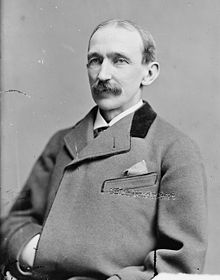Wayne MacVeagh
Isaac Wayne MacVeagh (born April 19, 1833 in Phoenixville , Chester County , Pennsylvania , † January 11, 1917 in Washington, DC ) was an American lawyer , diplomat , politician and attorney general (Attorney General) .
Studies, professional career and civil war
Wayne MacVeagh first completed a general education course at Yale University , which he finished in 1853 as the tenth best of his class with a Bachelor of Arts (BA) . He then studied law and graduated in 1856 with admission to the bar .
After serving three years as a lawyer, he was a district attorney in Chester County from 1859 to 1864 . During the Civil War he was the leader of militia units with which he succeeded in 1862 and 1863 in preventing the invasion of units of the Confederate Army . During the Civil War he rose to be captain of the infantry and major of the cavalry . In 1876 he founded a law firm in Philadelphia.
Political and diplomatic career
Start of political career
During the war he began his political career with the Republican Party , of which he was chairman in Pennsylvania in 1863. In 1870 he was appointed envoy to the Ottoman Empire as the successor to Edward Joy Morris . However, he resigned from this office after a year in protest against the treatment of Republicans by President Ulysses S. Grant . Then the post in Constantinople fell to George Henry Boker .
In 1871 he was opponent of his father-in-law Simon Cameron for the nomination as a candidate for the US Senate in an internal party dispute . In 1872 and 1873 he was a member of the Constituent Assembly of Pennsylvania. In 1877 he was appointed chairman of the MacVeagh Commission by President Rutherford B. Hayes , which was supposed to negotiate the protests in Louisiana against the administration of Hayes in favor of the withdrawal of government troops.
Attorney General under President Garfield and later offices
On March 5, 1881, US President James A. Garfield appointed him as Attorney General in his cabinet . However, he resigned from this post following the assassination of Garfield on December 15, 1881.
He then temporarily served as chairman of the Pennsylvania Public Service Reform Commission. After the support of the Democrat Grover Cleveland in the presidential election in 1892 , he was following his election from 1893 to 1897 as the successor of William Potter Ambassador of the United States to Italy . However, he returned to the Republicans in 1896. In 1897 he resumed his practice as a lawyer, but was soon also legal advisor to the District of Columbia .
In 1903 he became the United States' chief legal advisor before the Permanent Court of Arbitration in The Hague in damages proceedings against Venezuela , in which the repayment of loans from Venezuela to Germany , Great Britain and Italy was concerned.
His younger brother Franklin MacVeagh was Treasury Secretary under President William Howard Taft .
Web links
- Wayne MacVeagh in the nndb (English)
- Wayne MacVeagh the Miller Center of Public Affairs of the University of Virginia (English)
- Biography on the homepage of the Ministry of Justice
- Biography in the US legal dictionary
| personal data | |
|---|---|
| SURNAME | MacVeagh, Wayne |
| ALTERNATIVE NAMES | MacVeagh, Isaac Wayne (full name) |
| BRIEF DESCRIPTION | American lawyer and politician |
| DATE OF BIRTH | April 19, 1833 |
| PLACE OF BIRTH | Phoenixville , Pennsylvania |
| DATE OF DEATH | January 11, 1917 |
| Place of death | Washington, DC |

